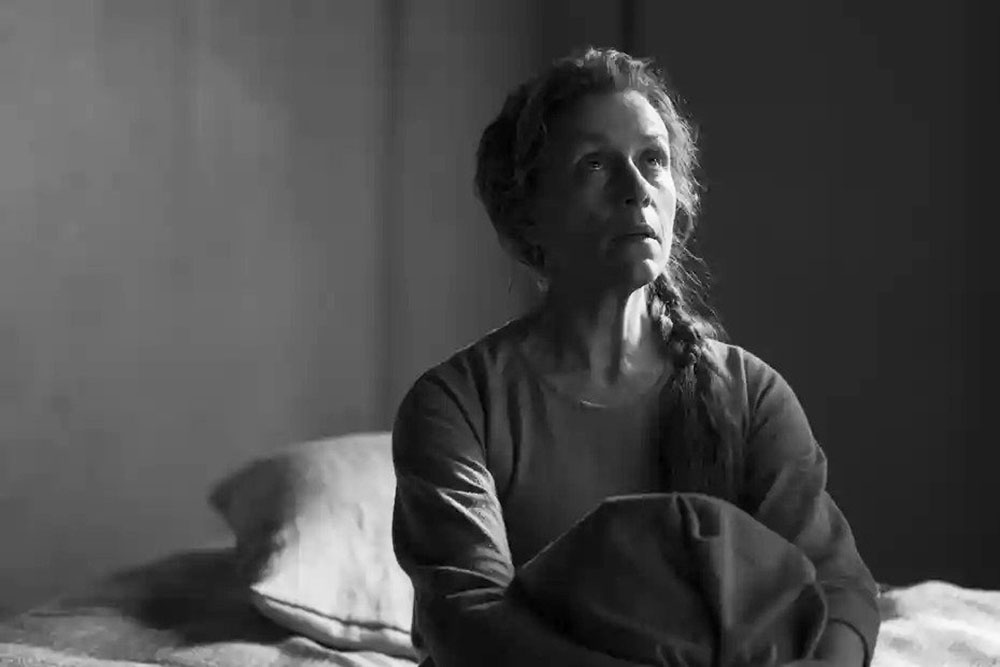With the sound of switching lights, the screen opens in white. We can see three ravens whirling around the sky. A bad omen juxtaposes imagery of a wounded man walking through the sand with blood dripping from his limbs. Monochromatic light with foggy atmosphere and eerie background music, it looks like we enter in a nightmare. With this striking imagery in the first scene, we enter into the violent world of power struggle, betrayal, and tragedy in medieval Scotland in Joel Coen’s “The Tragedy of Macbeth.”
Staying True to the Shakespeare Text
While the current trend is to adapt this classic play in modern-day contexts, Coen tries to stay true to the text and present the story with theatrics. The original lines in archaic English and the original soliloquies from the text are incorporated, which may distract people with little grasp of the language, but sound beautifully from the actors.
Denzel Washington is just fantastic in the titular role. A character he portrays with utmost sincerity and precision, it’s apt to say this is one of the best portrayals of Macbeth on-screen. The first Black actor to portray the doomed thane in a major film adaptation, Washington pulls off all the emotional layers of Macbeth. Frances McDormand, as Lady Macbeth, is also good in her role. Particularly in the scenes of soliloquies, she is unmatchable with her throwing of dialogues and interaction with the surroundings.
Alex Hassell as mysterious Ross impresses with his cunning demeanor. He is too slick to punish the crimes. Apart from the leads, his character arc is fulfilling and well-executed. But, the film under-utilizes some other despite casting some of the great actors in the business. For example, a veteran actor like Brendon Gleeson as Duncan hardly gets four scenes. And, here, the movie falters the most. Also, the scenes are fast-paced with continuous dialogues, which doesn’t permit a contemplative study of the characters.

An Solid Effort; a Study of Human Greed and Ambition
“Macbeth” is the study of human greed and ambition and its dangerous consequences. The text is rich with the contemplative and psychological study of flawed characters. But, in this adaptation, that part is surprisingly focused on less due to its rapid shifts from one scene to another with no comma or full stops between them.
Despite that fact, the film stands out with its mood created with its experimental approach in filmmaking. ‘German Expressionism’ can be predominantly seen in the entire movie. With gothic set pieces, monochromatic lighting, use of shadows in black and white, Cinematographer Bruno Delbonnel and Production Designer Stefan Dechant create perfect doom and sinisterness in this hell.
Undoubtedly, “The Tragedy of Macbeth” is an ambitious effort by Joel Coen. With stunning visuals, eerie background music by Carter Burwell (Coen’s longtime collaborator), astoundingly grand set pieces, and excellent acting, it sends a shiver down your spine. I think among the many “Macbeth” adaptations I’ve seen so far, “The Tragedy of Macbeth” is the closest in authenticity to the original text. With the Shakespearean language and theatrics, this is a tough call to make today. Though it dilutes some of the aspects in the process, it can’t be denied that this is a worthy experiment.
“The Tragedy of Macbeth” is currently available to stream on Apple TV+.
Support the Site: Consider becoming a sponsor to unlock exclusive, member-only content and help support The Movie Buff!